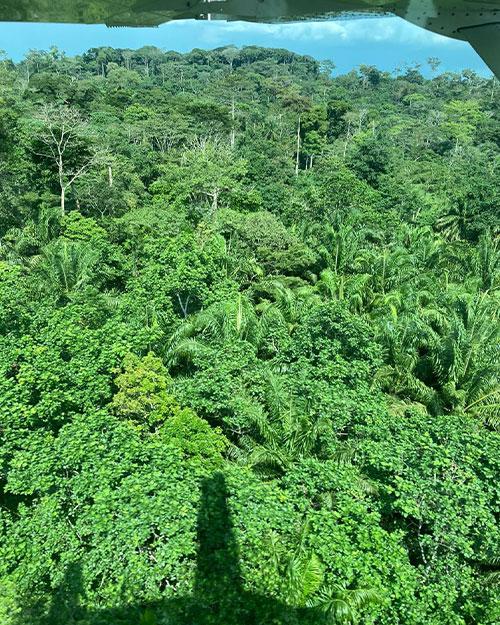Spring 2022 Lecture Archive
* There will not be live-stream broadcast for this lecture, and it will not be recorded.
‡ There will be live-stream broadcast for this lecture, but it will not be recorded.
# This speaker will join remotely
^ Tentative in-person speaker
Spring 2022 Hoch Cunningham Environmental Lecture Schedule
- Jan. 20, 2022:
Disabled Ecologies: Living With Impaired Landscapes (Sunaura Taylor)
- Jan. 27, 2022:
Turning Lawns into Meadows (Owen Wormser)
- Feb. 3, 2022:
Can Cities Save the Bees? (Nick Dorian^)
- Feb. 10, 2022:
Mapping Abundance for a Planetary Future: Protecting the Waters of Hawai'i (Candace Fujikane)
- Feb. 17, 2022:
Regenerative Agriculture and Natural Climate Solutions (Ben Dobson)
- Mar. 3, 2022:
Always Already Sustainable: How Alpaca Wool's Associations with Andean Indigeneity Help Define it as Environmentally Sustainable (Patricia Alvarez Astacio^)
- Mar. 10, 2022:
Coral Reparations (Amelia Moore^)
- Mar. 17, 2022:
Anticipating Extreme Events in Our Changed Climate (Erin Coghlan de Perez^)
- Mar. 31, 2022:
Willie Burnley Jr & Charlotte Kelly, Somerville City Councilors At-Large (Willie Burnley Jr and Charlotte Kelly^)
- Apr. 7, 2022:
Enclosing Agriculture's Messy Natures (Mark Bomford)
- Apr. 14, 2022:
The Birds, the Bees and the African Chocolate Trees (Luke Powell)
- Apr. 21, 2022:
Conservation Through a Lens: Why Stories Matter (Jen Guyton)
- Apr. 28, 2022:
Get into Good Trouble – Investigating and Publicly Reporting on Environmental Destruction (Sophia)
Spring 2022 Hoch Cunningham Environmental Lecture Information
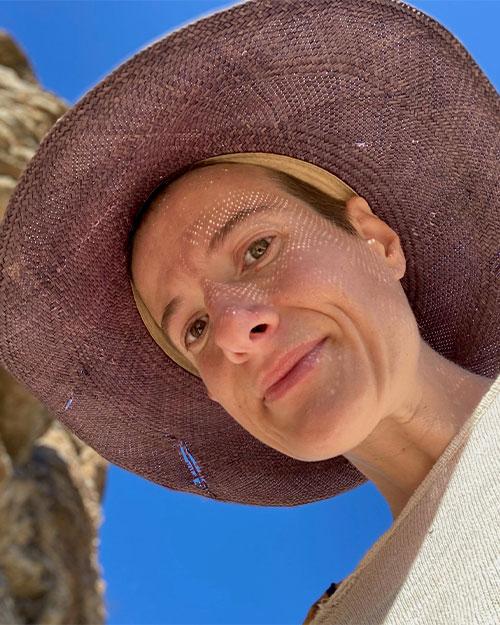
Sunaura Taylor is an artist and writer. She works at the intersection of disability studies, environmental humanities, animal studies, environmental justice, and art practice. She is author of Beasts of Burden: Animal and Disability Liberation (The New Press, 2017), which received the 2018 American Book Award. Along with academic journals, Taylor has written for a range of popular media outlets. Her artworks have been exhibited widely both nationally and internationally. She is currently working on a second book, Disabled Ecologies: Living With Impaired Landscapes. Taylor is an Assistant Professor in the Division of Society and Environment, in the Department of Environmental Science, Policy, and Management at the University of California, Berkeley.
Turning Lawns into Meadows
Speaker: Owen Wormser, Abound Design, owner
Thursday, January 27, 2022 | 12-1pm EST
View Lecture Recording – Jan. 27
An area the size of Washington State is presently mowed turf in the United States. This makes lawns the largest irrigated 'crop' in the country and the adverse impact of this ecological footprint is truly staggering. Meadows offer the opposite effect, providing myriad ecological benefits – including ongoing sequestering of carbon and increased biological diversity. Meadows are also significantly more affordable than lawns plus they're long lasting, low-maintenance, and very beautiful. Owen Wormser will discuss the benefits of native meadows while also explaining how to create thriving meadowscapes, sharing tips and strategies drawn from research and over 20 years of on-the-ground experience.
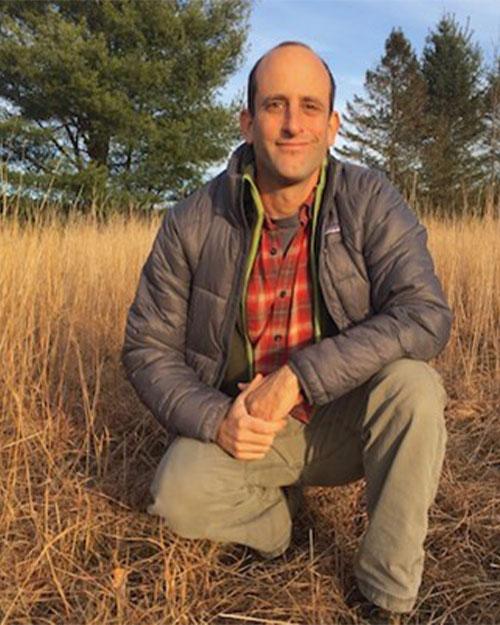
Owen Wormser was born and raised off the grid in rural Maine. His interest in plantsand the natural world led him to pursue a degree in landscape architecture. In 1998 Owen started his first landscape design and installation service in western Mass. Since then, he has built hundreds of landscapes influenced by his study of horticulture, permaculture, organic agriculture, and ecology. In 2010, Owen started Abound Design, which provides design and installation services with a focus on creating sustainability, regeneration, and beauty. Six years later, he cofounded Local Harmony, a nonprofit that promotes local regenerative projects and has overseen the planting of many thousands of native perennials. His first book, Lawns Into Meadows, Growing a Regenerative Landscape, was released in 2020. People interested in purchasing the book, can use promo code TUFTS25 for a discounted price.
Can Cities Save the Bees?
Speaker: Nick Dorian, Biology Department, Tufts University
Thursday, February 3, 2022 | 12-1pm EST
View Lecture Recording – Feb. 3
When you think of a city, biodiversity is not usually the first thing that comes to mind. But take a closer look and you'll find that cities are, in fact, teeming with flower-visiting insects--bees, butterflies, wasps, hover flies, beetles. These insect pollinators aid in the production of more than 75% of top global crops, yet many are in decline due to habitat loss, pesticide use, and climate change. Amidst these declines, cities have been vaulted into the spotlight as worthwhile, if at first counterintuitive, sites of biodiversity conservation. In this talk, Nick Dorian will explore how cities – and the people that inhabit them – can play a key role in pollinator conservation. You will come away with a richer appreciation for the secret lives of pollinators that live in cities and with clear action items for how you can contribute to conservation efforts on campus, in the Greater Boston area, and beyond.
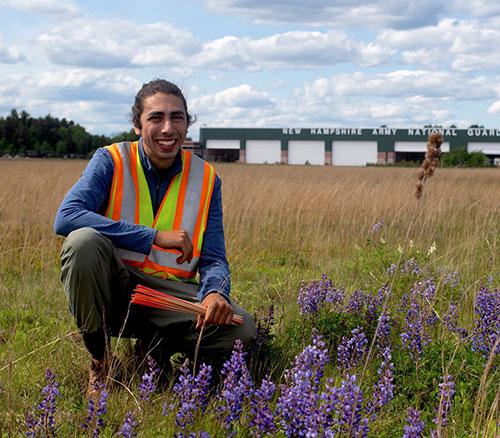
Nick Dorian is an ecologist, an educator, and a naturalist. His love for pollinators started as an undergraduate studying bumble bees at Tufts University, from where he received his B.S. in Biology and Environmental Studies in 2016. Now, as a Ph.D. student and NSF Graduate Research Fellow in the Biology Department at Tufts, Nick continues to uncover secrets about the wild bees in our backyards. He studies the population ecology of solitary bees – those which don't live in a hive or make honey – and the strategies they use to cope with rapid human-induced environmental change.
At Tufts, Nick has also committed himself to teaching. He is the founder and co-president of Tufts Pollinator Initiative, an urban pollinator conservation group working at the nexus of habitat creation and community education. Since 2019, TPI has planted 2500 sq. ft of pollinator habitat on the Medford-Somerville campus, engaged with more than 4000 people via events like pollinator safaris and native plant sales, and received national recognition as a Xerces Society Bee Campus USA. Most recently, Nick designed and taught an undergraduate Ex-College class titled All About Bees: Diversity, Ecology and Conservation in fall 2021. In his spare time, Nick enjoys exploring and photographing the wild places close to him. Follow him on Twitter @bee_searcher.
Mapping Abundance for a Planetary Future: Protecting the Waters of Hawaiʻi
Speaker: Candace Fujikane, English Department, University of Hawaiʻi
Thursday, February 10, 2022 | 12-1pm EST
View Lecture Recording – Feb. 10
As we bear witness to the wastelanding of the earth by late liberal capital, we can strike at capital by mapping the abundance it fears. Corporate-induced climate change is bringing about the demise of capitalist economies of scarcity, making way for Indigenous economies of abundance. Indigenous knowledges center the laws of the elements discerned through the art of kilo, keen intergenerational observation, forecasting, and activation that enable us to turn devastating conditions into renewed possibilities for abundance. In this talk, Candace Fujikane will focus on the awe-inspiring moʻo reptilian water deities who are battling leaking US military jet fuel tanks in Hawaiʻi.
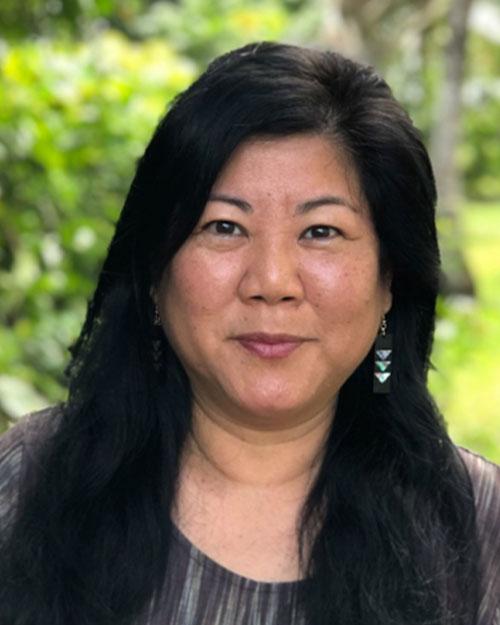
Candace Fujikane is Professor of English at the University of Hawaiʻi. She has stood for lands and waters and Hawaiian political independence for over twenty years, presenting testimony before settler state agencies, sharing her research with Kanaka Maoli and ally communities, and standing on front lines against police officers armed with tear gas and sound cannons. Her book, Mapping Abundance for a Planetary Future: Kanaka Maoli and Critical Settler Cartographies, was released in 2021, and she is now working on a new book manuscript entitled Elemental Cartographies for a Changing Earth.
Regenerative Agriculture and Natural Climate Solutions
Speaker: Ben Dobson, Hudson Carbon
Thursday, February 17, 2022 | 12-1pm EST
View Lecture Recording – Feb. 17
Ben Dobson, founder and president of Hudson Carbon, will discuss how agricultural systems transformation can help address the interconnected biodiversity, climate and ecological crises. Hudson Carbon is a research institute that studies the economics, ecological viability and carbon sequestration capacity of regenerative agricultural practices.
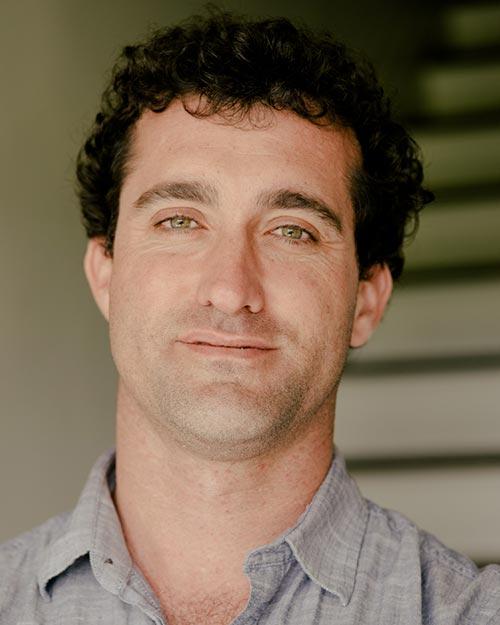
Ben Dobson is the founder and president of Hudson Carbon where he facilitates the implementation of regenerative organic food and agro-ecological systems that provide healthy food for people, and positive ecological outcomes. Born on an organic farm in Hillsdale, New York, and has twenty years of experience operating organic farms at various scales in many settings. From 2014 through 2020 he planned, implemented, and managed the transition of three thousand acres of conventional farmland in New York's Hudson Valley to a regenerative organic grain and livestock system. This work resulted in the development of a local and organic grain supply chain that plays a critical role in the local food system in the Hudson Valley and western New England. In 2018 Ben co-founded Hudson Hemp, demonstrating a regenerative organic model to the hemp industry and an important new crop to farms in his region. He continues his work with Hudson Hemp as a member of the board. These experiences have informed the development of Hudson Carbon and its ability to use scientific methodologies to quantify and value the ecosystem services provided by regenerative organic farms and ecosystems as a means to bring financial value to these critical ecological assets.
Always Already Sustainable: How Alpaca Wool's Associations with Andean Indigeneity Help Define it as Environmentally Sustainable
Speaker: Patricia Alvarez Astacio, Assistant Professor in the Anthropology Department, Brandeis University
Thursday, March 3, 2022 | 12-1pm EST
View Lecture Recording – Mar. 3
It is estimated that fast fashion produces, globally, around 5 billion pounds of textile waste annually. In the past two decades, ethical and slow fashion markets have expanded in response to demands to make this notoriously exploitative industry more environmentally and humanely sustainable. Alpaca wool has become a favored material in these markets for its luxurious qualities and always already sustainable nature. Despite its over two-hundred-year existence, the alpaca wool industry relies on the herding and animal care practices of Quechua-speaking herders in the Peruvian highlands. She argues that this persistence of indigenous forms of breeding and animal care are not only read by fashion industry actors as an assurance of sustainability, but this essentializing view of indigenous peoples as stewards of the environment obscures the ways in which extreme poverty, state abandonment and climate change make alpaca herding itself an unsustainable practice.
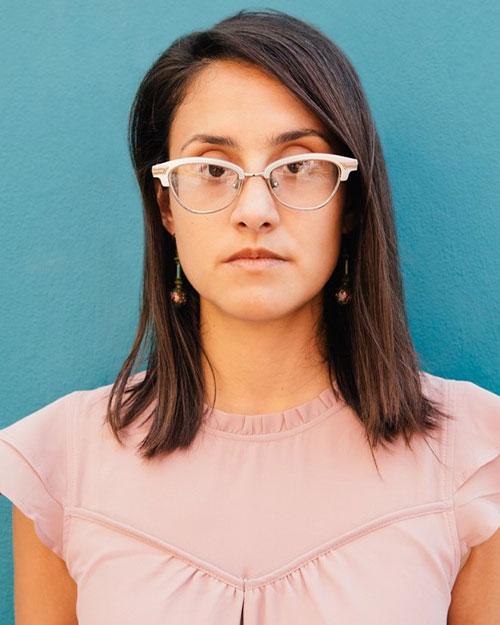
Patricia Alvarez Astacio is a Puerto Rican anthropologist and filmmaker whose scholarly research and creative practice develops in the folds between sensory and experimental ethnography and the documentary arts. Her most recent works converge on issues of indigenous labor and knowledge in capitalist creative industries, multispecies relations and representations of indigeneity in Latin America. She is currently working on her book manuscript, Moral Fibers, which ethnographically analyzes how ethical fashion supply chains value and incorporate indigenous textile traditions, artisanal labor and materials, like alpaca wool, to create ethical fashions. Her film, Entretejido, is a sensorially immersive exploration of the politics of these supply chains. Currently, she is also a producer for Backside, an observational film that follows the labor and daily life of the mostly Latinx migrant workforce who care for the horses of the Kentucky Derby. She is an Assistant Professor in the Anthropology Department and faculty for the Latin American, Caribbean and Latinx Studies Program, and the Film, TV, and Interactive Media Programs at Brandeis University.
Coral Reparations
Speaker: Amelia Moore, Associate Professor of Marine Affairs, University of Rhode Island
Thursday, March 10, 2022 | 12-1pm EST
View Lecture Recording – Mar. 10
Coral restoration involves the interplay of interdisciplinary science, corporate public relations, global crisis, and local politics. We are familiar with the story of coral in the Anthropocene: tropical coral reefs are the "rainforests of the sea" , extremely vulnerable to "human" threats of destructive fishing, pollution, and climate change, and dying at an alarming rate. Mainstream arguments for restoration highlight the private capital and techno-scientific experts who are growing super-coral and building large-scale underwater infrastructure to rehabilitate entire coral colonies. But are there ways to foster coral becoming that do not replicate the white supremacy and naked capitalism of Anthropocene science?
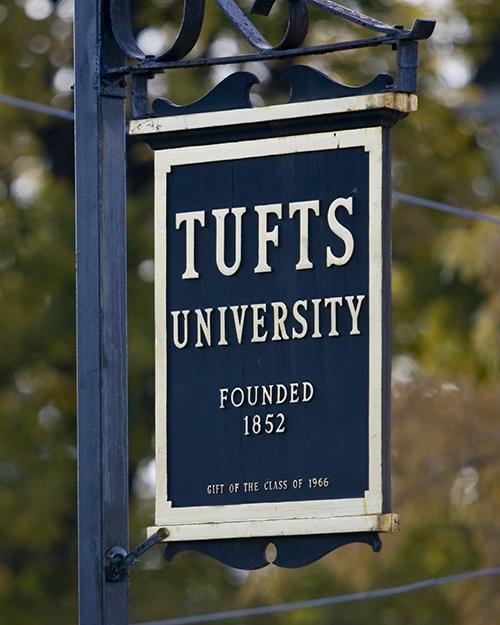
Amelia Moore is an Associate Professor of Marine Affairs at the University of Rhode Island. She has a Bachelor of Arts in Environmental Biology from Columbia University and a Doctorate in Sociocultural Anthropology from the University of California Berkeley. Since 2010 she has taught at the University of California Berkeley, the University of Miami, the University of The Bahamas, and the University of the Pacific in addition to the University of Rhode Island. In 2019, she published her first book with the University of California Press, Destination Anthropocene: Science and Tourism in The Bahamas, winner of the 2020 Nelson Graburn Prize from the Anthropology of Tourism Interest Group of the American Anthropological Association. She studies coastal and island life and the marine sciences in The Bahamas, Indonesia, and the United States utilizing anti-racist and anti-colonial methods, perspectives, and relationships.
Anticipating Extreme Events in Our Changed Climate
Speaker: Erin Coughlan de Perez, Associate Professor, Feinstein Center, Friedman School of Nutrition Science and Policy, Tufts University
Thursday, March 17, 2022 | 12-1pm EST
View Lecture Recording – Mar. 17
We live in a changed climate. Every day, we see evidence of the increasing frequency and intensity of extreme events around the world. To avoid disasters, we use earth system models to "see" into the future, both to predict short-term weather events and to predict long-term changes in extremes. There is preliminary evidence that forecast-based actions c an promote nutrition security around the world, and several governments have recently committed to increase the scale of these interventions. The Academic Alliance for Anticipatory Action is a new consortium of researchers from around the world studying how we can use weather models to act before climate disasters happen. We will present stories and evidence of how people are adapting to climate change in many different contexts.
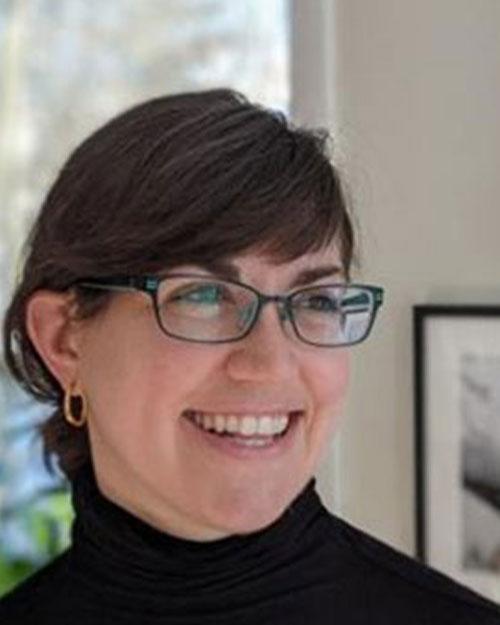
Dr. Erin Coughlan de Perez is anAssociate Professor in the Feinstein Center at the Friedman School of Nutrition Science and Policy at Tufts University. She bridges science, policy, and practice in her research on climate risk management around the world. She focuses on extreme events, exploring how droughts, floods, heatwaves, and other climate shocks can be anticipated before they happen. Erin works with humanitarian teams on the development of early action protocols to avoid disaster impacts, and she researches the adoption and effectiveness of climate change adaptation measures. Erin comes to the Feinstein Center from the Red Cross Red Crescent Climate Centre, where she built a global climate science team and led the first Forecast-based Financing pilots inthe Red Cross Red Crescent Movement. Erin retains a technical advisor position at the Climate Centre, to maintain links to humanitarian operations around the world. Erin was formerly an Associate at Columbia University. Erin received her PhD from VU University Amsterdam,her MA in Climate and Society from Columbia University, and her BS in Environmental Science and International Development from McGill University. Erin is also a Lead Author of the Intergovernmental Panel on Climate Change (IPCC) 6th Assessment Report. Her chapter is Decision-Making Options for Managing Risk, as part of the Working Group II on Impacts, Adaptation, and Vulnerability. Erin lives in Boston with her partner and children, where they are active foster parents and beekeepers.
Willie Burnley Jr & Charlotte Kelly, Somerville City Councilors At-Large
Speaker: Somerville City Councilors At-Large, Willie Burnley Jr and Charlotte Kelly, ran as part of the Somerville For All slate that prioritized affordable housing, expanding public transit, working alongside local social movements, and realizing municipal-level climate change mitigation. Please join us for a presentation and open discussion with the newly-elected councilors.
Thursday, March 31, 2022 | 12-1pm EST
View Lecture Recording – Mar. 31
This talk is co-sponsored with Tisch College.
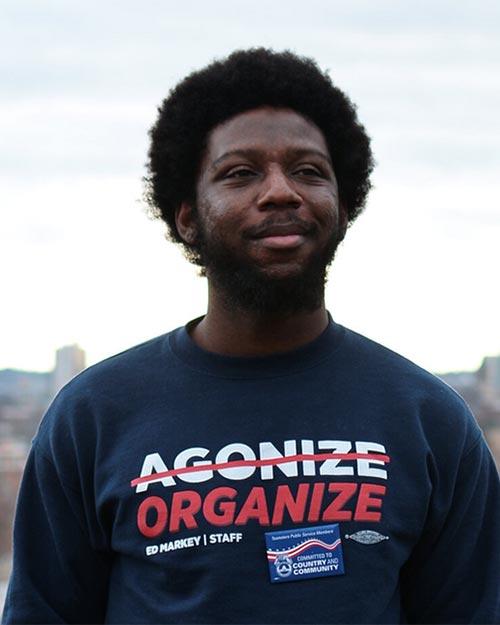
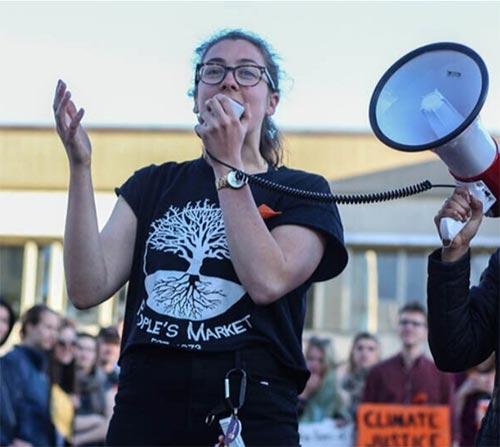
Willie Burnley Jr is a recently elected councilor At-large in the City of Somerville, MA. As a Black community organizer, former union steward with Teamsters 122, cyclist, and renter, his life has been rooted in the dual beliefs that every person can grow into the best version of themselves when given the chance and that people-powered movements can change the world. He run for Somerville City Council because he wanted to do more to deal with the crises of affordability, accessibility, and accountability in our government and create a city where residents shape the future, rather than developers. Some of his local work includes, organizing against evictions with Community Action Agency of Somerville, helping Somerville Community Land Trust plan a campaign to create permanently affordable housing, organizing for police accountability and budget justice and being an active member of Just Us Somerville, Union United, DSA, and Sunrise Boston.
Charlotte Kelly is a recently elected councilor At-large in the City of Somerville, MA. She is a queer, fourth generation Somerville renter and community organizer. She run for Somerville City Council to make sure community voices can shape a Somerville that works for all of us. At UMass Amherst, Charlotte was a student activist involved in the Student Labor Action Project, Coalition to End Rape Culture, and UMass Fossil Fuel Divestment, helping to make UMass the first public university system in the country to divest its endowment from fossil fuels. The burden of the student debt she took on to pay for her education drove her to fight to make public college free. This led her to advocacy work in the Massachusetts State House with the Center for Education Policy and Advocacy and electoral work as field director for Senator Pat Jehlen's 2016 campaign. After helping to reelect our progressive champion to the State Senate, she moved to Copenhagen, Denmark to work on a master's degree. While demands for universal public goods are treated as unrealistic by establishment figures, Charlotte saw first-hand that another way of living is possible where people can have access to social housing, free medical care, living wages, and good public services.
Enclosing Agriculture's Messy Natures
Speaker: Mark Bomford, Director of the Yale Sustainable Food Program
Thursday, April 7, 2022 | 12-1pm EST
View Lecture Recording – Apr. 7
Disruptive aspirations, exuberant acclaim and impatient capital rush towards vertical farming, a technology promising environmental salvation in sunless and soilless indoor agriculture. Vertical farming is a kind of Controlled Environment Agriculture (CEA), whose technologies and techniques are widespread in the production of high-value specialty crops. CEA's environmental promises are predicated on vastly reducing the natural resources needed for agricultural production, chiefly land and water. Mark Bomford's research examines the promissory narratives and performance of three large US vertical farming companies, considering what these sites enclose (keep in), exclose (keep out), and what futures they may foreclose (prevent from happening).
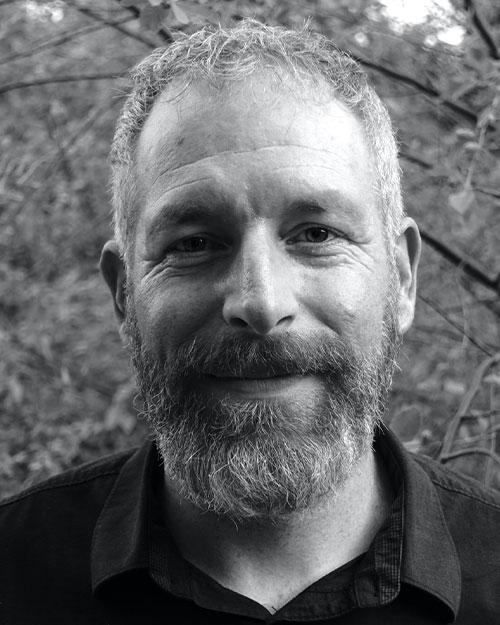
Mark Bomford is the Director of the Yale Sustainable Food Program and was the founding Director of the Centre for Sustainable Food Systems at the University of British Columbia (UBC). His current research, in cooperation with the University of Oxford's School of Geography and Environment, explores Controlled Environment Agriculture (CEA), more-than-human ecologies, and enclosure in practice and theory. Mark belongs to settler family, raised on and off-grid in northern British Columbia on Treaty 8 territory. He farmed for a decade on the unceded ancestral territory of the hən̓q̓əmin̓əm̓-speaking xʷməθkʷəy̓əm (Musqueam) people and currently lives, works, and vicariously farms on traditional Quinnipiac lands. He has been interested in climate change and sustainable agriculture since the mid-1990s, exploring and attempting to work with its challenges and contradictions through physics, philosophy, art, agroecology, commercial farming, community activism, science and technology studies, and human geography.
The Birds, the Bees and the African Chocolate Trees
Speaker: Luke Powell, CIBIO/BIOPOLIS/UPorto and Founding Director of Biodiversity Initiative
Thursday, April 14, 2022 | 12-1pm EST
View Lecture Recording – Apr. 14
Humans destroy the equivalent of one Ireland-sized swath of tropical rainforest every year – mostly due to expansion of agriculture; meanwhile, the human population of Africa will quadruple by the end of the century, putting enormous pressure on natural resources. Fortunately, cacao, most of which is grown in Africa, need not be as destructive as other crops – it is grown under a lush canopy of rainforest trees, which if managed appropriately, can support biodiversity comparable to that of primary rainforest. These shade trees also provide habitat for the African birds and bats that save farmers millions of dollars through pest control. Using cutting edge techniques to sequence insect and plant DNA left in birds and bat feces, researchers are mapping thousands of species in the food web – including shade trees and important pest insects. With this novel framework, they aim to create a system in which African farmers benefit through inexpensive, sustainable management of cocoa, and rainforest animals benefit through the planting of trees that mimic their natural habitat.
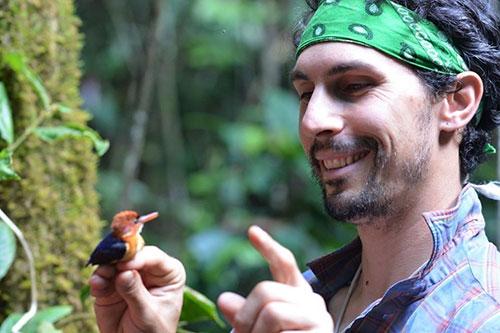
Luke L. Powell, PhD, is a Principal Researcher in the TROPIBIO program at CIBIO/BIOPOLIS/UPorto and the Founding Director of the NGO Biodiversity Initiative. Despite recent progress, the Earth continues to lose about a football field-sized patch of tropical rainforest each second. Luke is primarily interested in understanding the ecology of Afrotropical animals so that we can have the tools to sustainably manage tropical rainforests in the face of this rapid anthropogenic change. He received his BS at Tufts University and MSc at the University of Maine. He went on to a PhD at Louisiana State University, where he studied the effects of rainforest disturbance on birds of the Brazilian Amazon. Since then he has studied interspecific competition in birds at the Smithsonian Migratory Bird Center, and sustainable cacao agroforestry at Durham University and as a Marie Curie Fellow with the University of Glasgow. He has been working in tropical rainforests since 2005.
Conservation Through a Lens: Why Stories Matter
Speaker: Jen Guyton
Thursday, April 21, 2022 | 12-1pm EST
*This lecture was not recorded.
Stories have the power to persuade and motivate. In conservation, they can be a critical first step in convincing people to take action. In this talk, photographer Jen Guyton will discuss her journey from scientist to storyteller, and take you along on some adventures that she have had in conservation photography. She will also explore how storytelling has contributed and continues to contribute to conservation.
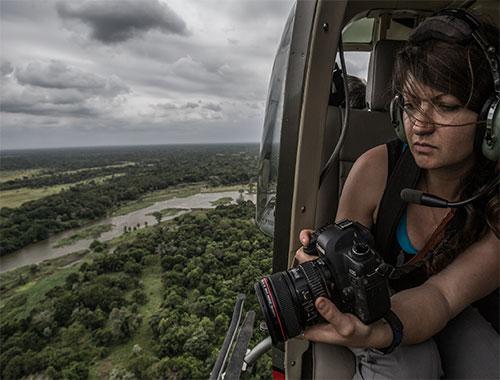
Dr. Jen Guyton is a photographer with a background in science, holding a PhD in Ecology and Evolutionary Biology from Princeton University. Her scientific training influences her work, which focuses on documenting the interface between humans and nature. She's passionate about investigating how people and wildlife are adapting to our changing planet. In 2019, she completed a Fulbright-National Geographic Digital Storytelling Fellowship in Gorongosa National Park, Mozambique. Jen is also a National Geographic Explorer and a Fellow with the International League of Conservation Photographers.
Photo credit: Piotr Naskrecki
Get into Good Trouble – Investigating and Publicly Reporting on Environmental Destruction
Speaker: Sophia*, Investigator into environmental and human crime
Thursday, April 28, 2022 | 12-1pm EST
*This lecture was not recorded.
Many people have not come across the term “supply chain” and are unlikely to have considered the connections between their weekly shop, choice of paint in their living room or which pension fund they invest in, and the biosphere of our home, here on Earth. Investigations like the ones Sophia undertakes into how natural resources like cocoa, gold and timber are produced and traded globally, expose the larger, systemic inequalities, environmental destruction and financially unprincipled behavior that is oftentimes embedded into our global supply chains - the same supply chains that may leave little of benefit in the places of extraction, whilst allowing you to whizz to work on an e-scooter. This lecture draws upon examples from Sophia’s environmental investigations, including from Africa, South America and Europe, and examines how we collectively and individually question, what we accept as “normal” business and human practice and what we can do differently with our curious minds.
Sophia is an attentive listener with a curious mind. For over a decade she has investigated the production, trade, management and financing of natural resources, and published her findings. She has worked for international organizations, including non-governmental organizations and the Security Council. Her work is inspired by Naomi Shihab Nye's poem 'Please Describe How You Became a Writer', which asks, 'Why weren't they looking to begin with?'
* Sophia's last name is omitted for professional reasons.
